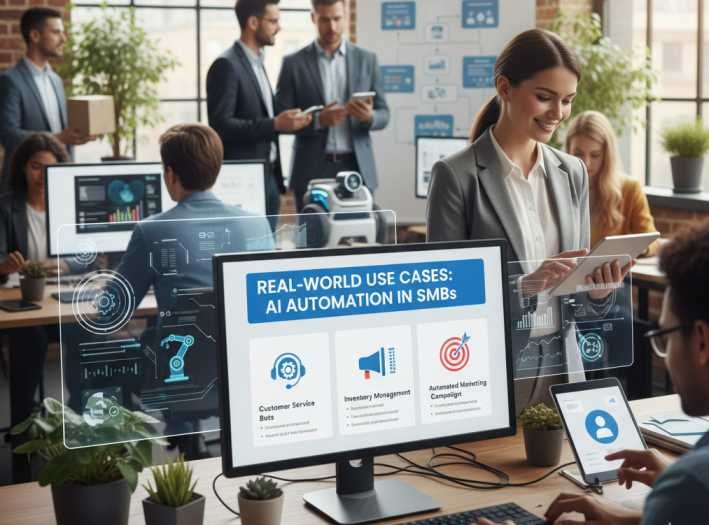“AI isn’t just for big companies anymore—SMBs are using it to save time, reduce costs, and grow faster.”
Small and medium-sized businesses (SMBs) are discovering the power of AI automation and AI agents. From customer service to marketing, finance, and HR, AI is transforming how small businesses operate. This guide highlights real-world examples, practical use cases, and actionable insights for business owners.
What Is AI Automation?
Definition: AI automation uses artificial intelligence to perform tasks that used to require human effort.
Benefits at a Glance:
- ✅ Automates repetitive tasks
- ✅ Reduces human error
- ✅ Enables scalability without extra staff
Key Insight: SMBs can now compete with larger companies by using AI to handle routine operations efficiently.
Why SMBs Are Embracing AI
2024–2025 AI Adoption Stats:
- 68% of U.S. SMBs use AI regularly (up from 48% mid-2024)
- 75% report improved efficiency, decision-making, and revenue
Problems AI Solves for SMBs:
- Limited resources → AI handles tasks that require more staff
- High customer expectations → AI enables fast, personalized service
- Complex data → AI provides actionable insights
Real-World Use Cases of AI Automation
1. Customer Service & Support
How AI Helps:
- Chatbots handle FAQs and track orders
- Virtual assistants respond 24/7
Example:
A retail store implemented an AI chatbot → 30% faster response times
Pros:
- 24/7 availability
- Cost-effective
Cons:
- Limited to set queries
- Lacks human empathy
2. Sales & Marketing Automation
How AI Helps:
- Personalized email campaigns
- Audience segmentation and targeted ads
Example:
E-commerce business used AI-driven emails → 20% increase in sales
Pros:
- Improved targeting
- Higher ROI
Cons:
- Requires accurate data
- Initial setup takes effort
3. Accounting & Finance
How AI Helps:
- Automates invoicing, reporting, and expense tracking
- Reduces manual errors
Example:
Accounting firm automated bookkeeping → staff focused on advisory → higher client satisfaction
Pros:
- Real-time financial insights
- Time-saving
Cons:
- Needs correct data input
- Integration can be challenging
4. Inventory & Supply Chain Management
How AI Helps:
- Demand forecasting
- Inventory optimization
- Supply chain efficiency
Example:
The manufacturer used AI to forecast demand → 15% lower inventory costs
Pros:
- Reduces waste
- Improves efficiency
Cons:
- Requires historical data
- Initial AI investment needed
5. Human Resources & Recruitment
How AI Helps:
- Screens resumes
- Schedules interviews
- Manages employee records
Example:
Tech startup used AI for recruitment → 25% faster hiring process
Pros:
- Objective candidate screening
- Streamlined HR processes
Cons:
- May miss nuanced qualities
- AI model updates required
The Future of AI in SMBs
Market Projection:
- $194.6B in 2024 → $567B by 2032, CAGR 14.3% (credenceresearch.com)
Emerging Trends:
- Generative AI: Creates content, graphics, and solutions
- AI Agents: Automate complex tasks independently
- Edge Computing: Faster AI responses by processing data locally
Pro Tip: Start with small automation projects → measure ROI → scale gradually.
Key Takeaways for SMB Owners
- AI automation frees time and reduces costs
- AI agents manage customer service, sales, finance, and HR
- Real-world examples show measurable results
- Accessible and scalable for SMBs of all sizes
- Early adoption positions your business for growth
Take the first step: Identify repetitive tasks in your business that AI can automate. Test one AI tool, track results, and scale gradually.
“The future belongs to SMBs that embrace intelligent business automation today.”
